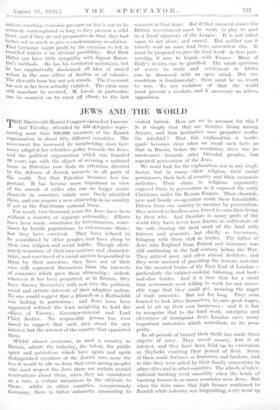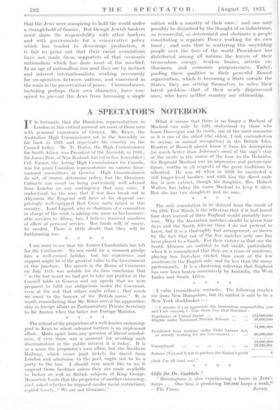JEWS AND THE WORLD
THE Nineteenth Zionist Congress opened at Lucerne last Tuesday, attended by 450 delegates repre- senting more than 900,000 members of the Zionist organization in about fifty different countries. The movement has increased its membership since Ger- many adopted her relentless policy towards the Jews, and the political organization which was founded 38 years ago with the object of securing a national home in Palestine now finds its attention directed to the defence of Jewish interests in all parts of the world. Not that Palestine becomes less im- portant. It has become more important in view of the crowds of exiles who can no longer secure domicile in countries which once freely admitted them, and can acquire a new citizenship in no country if not in the Palestinian national home.
For nearly two thousand years the Jews have been without a country or separate nationality. Efforts have been made, sometimes by Governments, some- times by hostile populations, to exterminate them ; but they have survived. They have refused to be assimilated by other peoples, and have clung to their own religion and social habits. Though obsti- nately tenacious of their own customs and character- istics, and convinced of a racial mission bequeathed to them by their ancestors, they Ilave not of their own will separated themselves from the interests of countries which gave them citizenship ; indeed, wherever it has been permitted, as in Britain, they have thrown themselves with zeal into the political, social and artistic interests of their adoptive nation. No one would suggest that a Disraeli or a Rothschild was lacking in patriotism ; and Jews have been appointed without the least misgiving to hold the offices of Viceroy, Governor-General and Lord Chief Justice. No responsible person has ever dared to . suggest that such men stood for any interest but the interest of the country that appointed them.
Whilst almost everyone, in such a country as Britain, admits the industry, the, talent, the public spirit and patriotism which have again and again distinguished members of the Jewish race, none the less it would be idle to deny that even among peoples 'who most respect the Jews there are certain mental reservations about them, when they are considered as a race, a certain uneasiness in the attitude to them ; whilst in other countries, conspicuously Germany, there is bitter animosity amounting to violent hatred. How arc we to account for this ? Is it simply that they are Semites living among Aryans, and that instinctive race prejudice works the mischief ? That this explanation is inade- quate becomes clear when we recall such facts as that in Russia, before the revolution, there was no intolerance towards other Oriental peoples, but repeated persecution of the Jews. We must look for the explanation not in any single factor, but in many—their religion, their racial persistence, their lack of country and their economic activities. Their claim to religious superiority exposed them to persecution as it exposed the early Christians under the Roman Empire. Their clannish- ness and family co-operation made them formidable. Driven from one country to another by persecution, they arrived as landless men, forced to earn their living by their wits. And therefore in many parts of the world they have never been known as cultivators of the soil, sharing the hard work of the land with farmers and peasants, but chiefly as townsmen, bringing with them skill in trades. The influx of Jews into England from Poland and Germany was still continuing in the half century before the War. They arrived poor, and often almost destitute, and they were accused of providing the human material for the sweated trades of the East End of London— particularly the cabinet-making, tailoring, and boot- and-shoe trades. And it is true that for a short time newcomers were willing to work for any miser- able wage that they could get, arousing the anger of trade unionists. But not for long. They soon learned to look after themselves, to earn good wages, and to set up their own businesses ; and it is fair to recognize that to the hard work, enterprise and cleverness of immigrant Jews London owes many important industries which contribute to its pros- perity. In all periods of history their thrift has made them objects of envy. They saved money, lent it at interest, and they have been held up to execration as Shylocks exacting their pound of flesh. Some of them made fortunes as financiers and bankers, and in this they were aided by their family connexions in other cities and in other countries. The wheels of inter- national banking went smoothly when the heads of banking houses in so many countries were Jews. But when the time came that high finance continued to flourish while industry was languishing, a cry went up that the Jews were conspiring to hold the world under a stranglehold of finance. But though Jewish bankers must share the responsibility with other bankers and with governments for a conservative policy which has tended to discourage production, it is fair to point out that their racial associations have not made them supporters of that economic nationalism which has done most of the mischief. In an age of nationalism run mad they are by instinct and interest internationalists, working necessarily for co-operation between nations, and concerned in the main in the preservation of peace. Circumstances, including perhaps their own character, have con- spired to prevent the Jews from becoming a single nation with a country of their own ; and one may possibly be disturbed by the thought of so industrious, so resourceful, so determined and obstinate a people constituting a separate Power working for its own hand ; and note that in scattering this unyielding people over the face of the world Providence has. distributed among all nations the leaven of their tremendous energy, restless brains, artistic en- thusiasm, and economic purposiveness. Today,: pooling these qualities in their powerful Zionist. organisation, which is becoming a State outside the States, they are setting themselves to solve their latest problem—that of their newly dispossessed. ones, who have neither country nor citizenship.



































 Previous page
Previous page